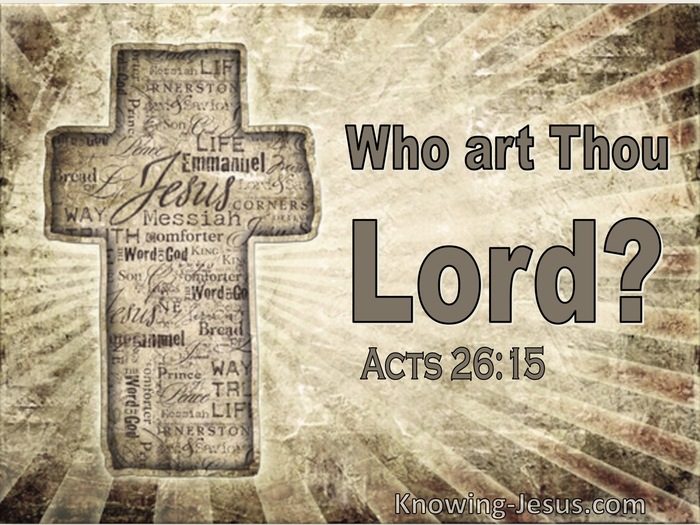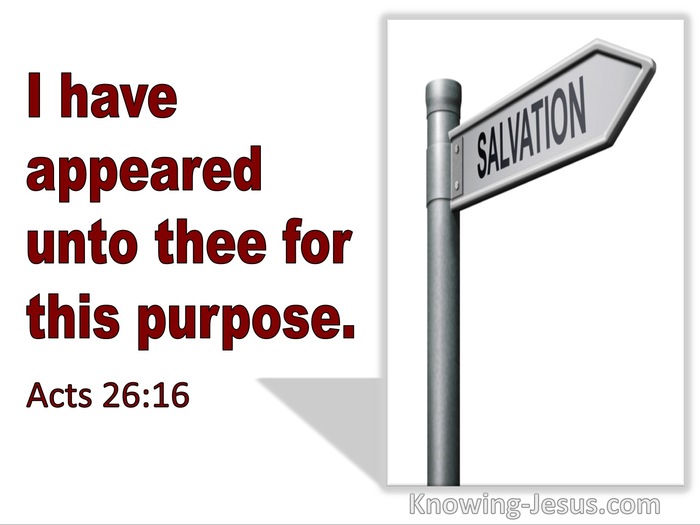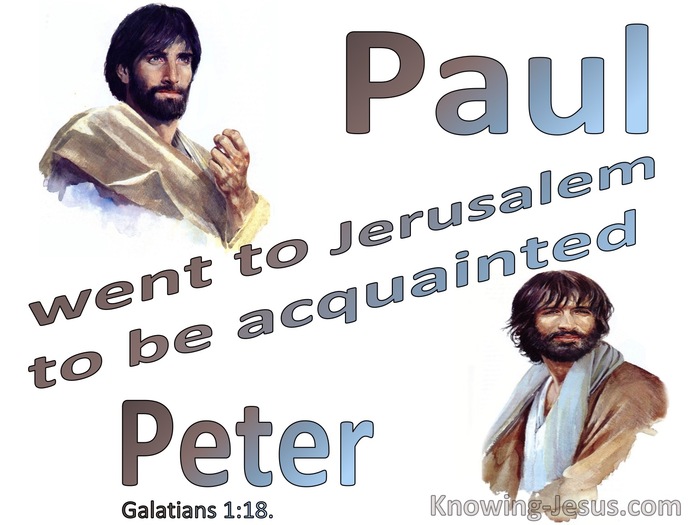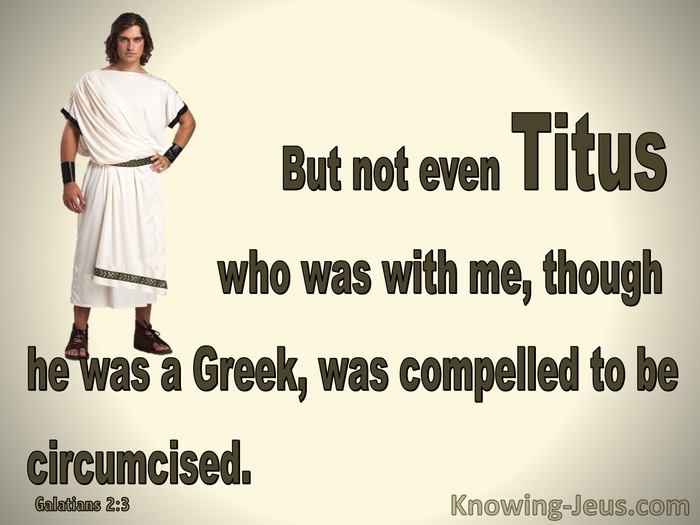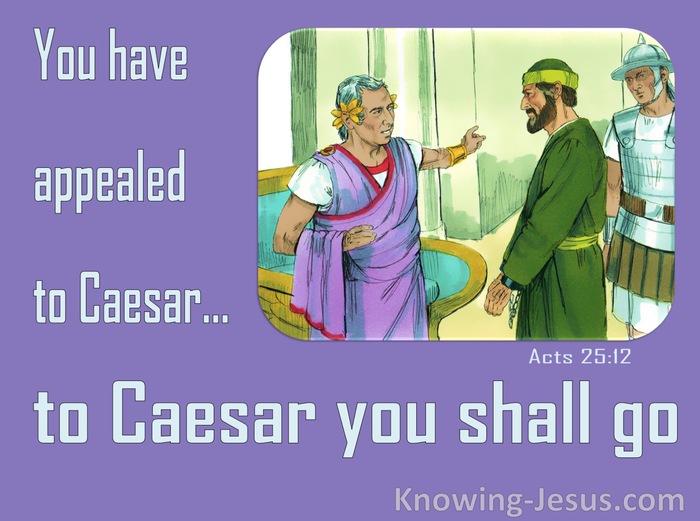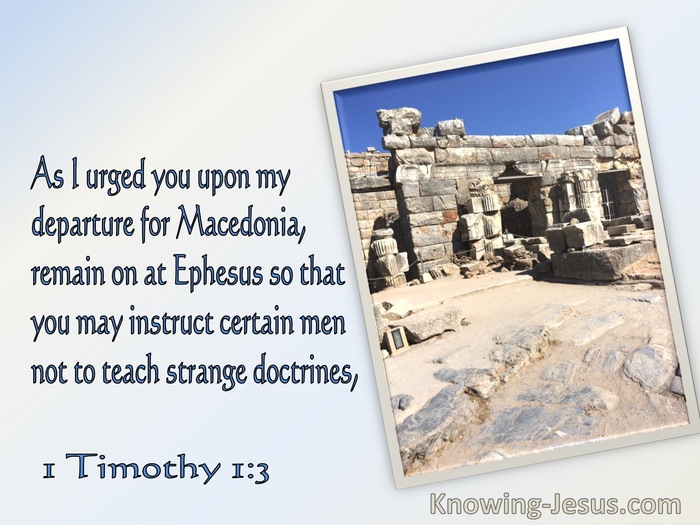55 Bible Verses about Paul, Life Of
Most Relevant Verses
though I myself might have [some grounds for] confidence in the flesh [if I were pursuing salvation by works]. If anyone else thinks that he has reason to be confident in the flesh [that is, in his own efforts to achieve salvation], I have far more: circumcised when I was eight days old, of the nation of Israel, of the tribe of Benjamin, a Hebrew of Hebrews [an exemplary Hebrew]; as to the [observance of the] Law, a Pharisee;
So the commander came and asked Paul, “Tell me, are you a Roman?” And he said, “Yes.” The commander replied, “I purchased this citizenship [of mine] for a large sum of money [so how did you acquire yours?].” Paul said, “But I was actually born a citizen.”
“I am a Jew, born in Tarsus of Cilicia, but brought up in this city, educated at the feet of Gamaliel according to the strictness of the law of our fathers, being ardent and passionate for God just as all of you are today.
Paul said, “I am a Jew from Tarsus in Cilicia (Mersin Province, Turkey), a citizen of no insignificant city; and I beg you, allow me to speak to the people.”
After this Paul left Athens and went to Corinth. There he met a Jew named Aquila, a native of Pontus, who had recently come from Italy with his wife, Priscilla, because [the Roman Emperor] Claudius had issued an edict that all the Jews were to leave Rome. Paul went to see them, and because he was of the same trade, he stayed with them; and they worked together for they were tent-makers.
circumcised when I was eight days old, of the nation of Israel, of the tribe of Benjamin, a Hebrew of Hebrews [an exemplary Hebrew]; as to the [observance of the] Law, a Pharisee; as to my zeal [for Jewish tradition], a persecutor of the church; and as to righteousness [supposed right living] which [my fellow Jews believe] is in the Law, I proved myself blameless.
Now Saul, still breathing threats and murder against the disciples of the Lord [and relentless in his search for believers], went to the high priest, and he asked for letters [of authority] from him to the synagogues at Damascus, so that if he found any men or women there belonging to the Way [believers, followers of Jesus the Messiah], men and women alike, he could arrest them and bring them bound [with chains] to Jerusalem.
And I said, ‘Lord, they themselves know [without any doubt] that in one synagogue after another I used to imprison and beat those who believed in You [and Your message of salvation]. And when the blood of Your witness Stephen was being shed, I also was standing nearby approving and consenting [to his death], and guarding the coats of those who were killing him.’
You have heard of my career and former manner of life in Judaism, how I used to hunt down and persecute the church of God extensively and [with fanatical zeal] tried [my best] to destroy it.
Now Saul, still breathing threats and murder against the disciples of the Lord [and relentless in his search for believers], went to the high priest, and he asked for letters [of authority] from him to the synagogues at Damascus, so that if he found any men or women there belonging to the Way [believers, followers of Jesus the Messiah], men and women alike, he could arrest them and bring them bound [with chains] to Jerusalem. As he traveled he approached Damascus, and suddenly a light from heaven flashed around him [displaying the glory and majesty of Christ]; read more.
and he fell to the ground and heard a voice [from heaven] saying to him, “Saul, Saul, why are you persecuting and oppressing Me?” And Saul said, “Who are You, Lord?” And He answered, “I am Jesus whom you are persecuting, now get up and go into the city, and you will be told what you must do.” The men who were traveling with him [were terrified and] stood speechless, hearing the voice but seeing no one. Saul got up from the ground, but though his eyes were open, he could see nothing; so they led him by the hand and brought him into Damascus. And he was unable to see for three days, and he neither ate nor drank. Now in Damascus there was a disciple named Ananias; and the Lord said to him in a vision, “Ananias.” And he answered, “Here I am, Lord.” And the Lord said to him, “Get up and go to the street called Straight, and ask at the house of Judas for a man from Tarsus named Saul; for he is praying [there], and in a vision he has seen a man named Ananias come in and place his hands on him, so that he may regain his sight.” But Ananias answered, “Lord, I have heard from many people about this man, especially how much suffering and evil he has brought on Your saints (God’s people) at Jerusalem; and here [in Damascus] he has authority from the high priests to put in chains all who call on Your name [confessing You as Savior].” But the Lord said to him, “Go, for this man is a [deliberately] chosen instrument of Mine, to bear My name before the Gentiles and kings and the sons of Israel; for I will make clear to him how much he must suffer and endure for My name’s sake.” So Ananias left and entered the house, and he laid his hands on Saul and said, “Brother Saul, the Lord Jesus, who appeared to you on the road as you came [to Damascus], has sent me so that you may regain your sight and be filled with the Holy Spirit [in order to proclaim Christ to both Jews and Gentiles].” Immediately something like scales fell from Saul’s eyes, and he regained his sight. Then he got up and was baptized; and he took some food and was strengthened.
For several days [afterward] Saul remained with the disciples who were at Damascus.
“I am a Jew, born in Tarsus of Cilicia, but brought up in this city, educated at the feet of Gamaliel according to the strictness of the law of our fathers, being ardent and passionate for God just as all of you are today. I persecuted and pursued the followers of this Way to the death, binding them with chains and putting [followers of Jesus] both men and women into prisons, as the high priest and all the Council of the elders (Sanhedrin, Jewish High Court) can testify; because from them I received letters to the brothers, and I was on my way to Damascus in order to bring those [believers] who were there to Jerusalem in chains to be punished. read more.
“But as I was on my way, approaching Damascus about noontime, a great blaze of light suddenly flashed from heaven and shone around me. And I fell to the ground and heard a voice saying to me, ‘Saul, Saul, why are you persecuting Me?’ And I replied, ‘Who are You, Lord?’ And He said to me, ‘I am Jesus the Nazarene, whom you are persecuting.’ Now those who were with me saw the light, but did not understand the voice of the One who was speaking to me. And I asked, ‘What shall I do, Lord?’ And the Lord answered me, ‘Get up and go into Damascus. There you will be told all that is appointed and destined for you to do.’ But since I could not see because of the [glorious intensity and dazzling] brightness of that light, I was led by the hand by those who were with me and came into Damascus. “And one Ananias, a devout man according to the standard of the Law, and well spoken of by all the Jews who lived there, came to [see] me, and standing near, he said to me, ‘Brother Saul, receive your sight!’ And at that very moment I [recovered my sight and] looked up at him. And he said, ‘The God of our fathers has appointed you to know His will, [and to progressively understand His plan with clarity and power] and to see the Righteous One [Jesus Christ, the Messiah] and to hear a message from His [own] mouth. For you will be His witness to all men testifying of what you have seen and heard. Now, why do you delay? Get up and be baptized, and wash away your sins by calling on His name [for salvation].’
“So then, I [once] thought to myself that it was my duty to do many things in opposition to the name of Jesus of Nazareth. And this is just what I did in Jerusalem; I not only locked up many of the saints (God’s people) in prison after receiving authority from the chief priests, but also when they were being condemned to death, I cast my vote against them. And I often punished them [making them suffer] in all the synagogues and tried to force them to blaspheme; and in my extreme rage at them, I kept hunting them even to foreign cities [harassing and persecuting them]. read more.
“While so engaged, as I was traveling to Damascus with the authority and commission and full power of the chief priests, at midday, O King, I saw on the way a light from heaven surpassing the brightness of the sun, shining all around me and those who were traveling with me. And when we all had fallen to the ground, I heard a voice in the Hebrew dialect (Jewish Aramaic) saying to me, ‘Saul, Saul, why are you persecuting Me? It is hard for you to kick [repeatedly] against the goads [offering pointless resistance].’ And I said, ‘Who are You, Lord?’ And the Lord said, ‘I am Jesus whom you are persecuting. Get up and stand on your feet. I have appeared to you for this purpose, to appoint you [to serve] as a minister and as a witness [to testify, with authority,] not only to the things which you have seen, but also to the things in which I will appear to you, [choosing you for Myself and] rescuing you from the Jewish people and from the Gentiles, to whom I am sending you, to open their [spiritual] eyes so that they may turn from darkness to light and from the power of Satan to God, that they may receive forgiveness and release from their sins and an inheritance among those who have been sanctified (set apart, made holy) by faith in Me.’
But when God, who had chosen me and set me apart before I was born, and called me through His grace, was pleased to reveal His Son in me so that I might preach Him among the Gentiles [as the good news—the way of salvation], I did not immediately consult with anyone [for guidance regarding God’s call and His revelation to me]. Nor did I [even] go up to Jerusalem to those who were apostles before me; but I went to Arabia and stayed awhile, and afterward returned once more to Damascus.
In Damascus the governor (ethnarch) under King Aretas guarded the city of Damascus in order to arrest me, and I was [actually] let down in a basket through a window in the wall, and slipped through his fingers.
and he took some food and was strengthened.
For several days [afterward] Saul remained with the disciples who were at Damascus. And immediately he began proclaiming Jesus in the synagogues, saying, “This Man is the Son of God [the promised Messiah]!” All those who heard him continued to be amazed and said, “Is this not the man who in Jerusalem attacked those who called on this name [of Jesus], and had come here [to Damascus] for the express purpose of bringing them bound [with chains] before the chief priests?” read more.
But Saul increased in strength more and more, and continued to perplex the Jews who lived in Damascus by examining [theological evidence] and proving [with Scripture] that this Jesus is the Christ (the Messiah, the Anointed). After considerable time had passed [about three years or so], the Jews plotted together to kill him, but their plot became known to Saul. They were also watching the city’s gates day and night so they could kill him; but his disciples took him at night and let him down through an opening in the wall, lowering him in a large basket.
Then three years later I did go up to Jerusalem to get acquainted with Cephas (Peter), and I stayed with him fifteen days.
When he arrived in Jerusalem, he tried to join the disciples; but they were all afraid of him, not believing that he really was a disciple. However, Barnabas took him and brought him to the apostles, and described to them how Saul had seen the Lord on the road [to Damascus], and how He had spoken to him, and how at Damascus Saul had preached openly and spoken confidently in the name of Jesus. So he was with them, moving around freely [as one among them] in Jerusalem, speaking out boldly in the name of the Lord.
He was talking and arguing with the Hellenists (Greek-speaking Jews); but they were attempting to kill him. When the brothers found out [about the plot], they brought him down to Caesarea [Maritima] and sent him off to Tarsus [his home town].
And Barnabas left for Tarsus to search for Saul; and when he found him, he brought him back to Antioch. For an entire year they met [with others] in the church and instructed large numbers; and it was in Antioch that the disciples were first called Christians.
Now in the church at Antioch there were prophets [who spoke a new message of God to the people] and teachers: Barnabas, Simeon who was called Niger, Lucius of Cyrene, Manaen who had been brought up with Herod [Antipas] the tetrarch, and Saul. While they were serving the Lord and fasting, the Holy Spirit said, “Set apart for Me Barnabas and Saul (Paul) for the work to which I have called them.” Then after fasting and praying, they laid their hands on them [in approval and dedication] and sent them away [on their first journey]. read more.
So then, being sent out by the Holy Spirit, they went down to Seleucia, and from there they sailed to Cyprus. When Barnabas and Saul arrived at Salamis, they began to preach the word of God [proclaiming the message of eternal salvation through faith in Christ] in the synagogues of the Jews; and they also had John [Mark] as their assistant. When they had traveled through the entire island [of Cyprus] as far as Paphos, they found a sorcerer, a Jewish false prophet named Bar-Jesus,
Now in Iconium Paul and Barnabas went into the Jewish synagogue together and spoke in such a way [with such power and boldness] that a large number of Jews as well as Greeks believed [and confidently accepted Jesus as Savior];
Then after a period of fourteen years I again went up to Jerusalem, [this time] with Barnabas, taking Titus along also. I went up [to Jerusalem] because of a [divine] revelation, and I put before them the gospel which I preach among the Gentiles. But I did so in private before those of reputation, for fear that I might be running or had run [the course of my ministry] in vain. But [all went well, for] not even Titus, who was with me, was compelled [as some had anticipated] to be circumcised, despite the fact that he was a Greek. read more.
My concern was because of the false brothers [those people masquerading as Christians] who had been secretly smuggled in [to the community of believers]. They had slipped in to spy on the freedom which we have in Christ Jesus, in order to bring us back into bondage [under the Law of Moses]. But we did not yield to them even for a moment, so that the truth of the gospel would continue to remain with you [in its purity]. But from those who were of high reputation (whatever they were—in terms of individual importance—makes no difference to me; God shows no partiality—He is not impressed with the positions that people hold nor does He recognize distinctions such as fame or power)—well, those who were of reputation contributed nothing to me [that is, they had nothing to add to my gospel message nor did they impose any new requirements on me]. But on the contrary, they saw that I had been entrusted with the gospel to the uncircumcised (Gentiles), just as Peter had been [entrusted to proclaim the gospel] to the circumcised (Jews); (for He who worked effectively for Peter and empowered him in his ministry to the Jews also worked effectively for me and empowered me in my ministry to the Gentiles). And recognizing the grace [that God had] bestowed on me, James and Cephas (Peter) and John, who were reputed to be pillars [of the Jerusalem church], gave to me and Barnabas the right hand of fellowship, so that we could go to the Gentiles [with their blessing] and they to the circumcised (Jews). They asked only [one thing], that we remember the poor, the very thing I was also eager to do.
And this they did, sending the contribution to the elders by Barnabas and Saul.
Some men came down from Judea and began teaching the brothers, “Unless you are circumcised in accordance with the custom of Moses, you cannot be saved.” Paul and Barnabas disagreed greatly and debated with them, so it was determined that Paul and Barnabas and some of the others from their group would go up to Jerusalem to the apostles and the elders [and confer with them] concerning this issue. So, after being supplied and sent on their way by the church, they went through both Phoenicia and Samaria telling in detail the conversion of the Gentiles, and they brought great joy to all the believers. read more.
When they arrived in Jerusalem, they were received warmly by the church and the apostles and the elders, and they reported to them all the things that God had accomplished through them. But some from the sect of the Pharisees who had believed [in Jesus as the Messiah] stood up and said, “It is necessary to circumcise the Gentile converts and to direct them to observe the Law of Moses.” The apostles and the elders came together to consider this matter.
After some time Paul said to Barnabas, “Let us go back and visit the brothers and sisters (believers) in every city where we preached the message of the Lord, and see how they are doing.” Now Barnabas wanted to take [his cousin] John, who was called Mark, along with them. But Paul kept insisting that they should not take along with them the one who had quit and deserted them in Pamphylia and had not gone on with them to the work. read more.
And it became such a sharp disagreement that they separated from one another, and Barnabas took [John] Mark with him and sailed away to Cyprus. But Paul chose Silas [who was again in Antioch] and set out [on his second journey], commended by the brothers to the grace and favor of the Lord. And he traveled through Syria and Cilicia, strengthening the churches.
Now they passed through the territory of Phrygia and Galatia, after being forbidden by the Holy Spirit to speak the word in [the west coast province of] Asia [Minor]; and after they came to Mysia, they tried to go into Bithynia, but the Spirit of Jesus did not permit them; so passing by Mysia, they went down to Troas.
Then a vision appeared to Paul in the night: a man from [the Roman province of] Macedonia was standing and pleading with him, saying, “Come over to Macedonia and help us!” And when he had seen the vision, we (including Luke) tried to go on into Macedonia at once, concluding that God had called us to preach the gospel to them. So setting sail from Troas, we ran a direct course to Samothrace, and the next day [went on] to Neapolis; read more.
and from there [we came] to Philippi, which is a leading city of the district of Macedonia, a Roman colony. We stayed on in this city for several days;
Now after Paul and Silas had traveled through Amphipolis and Apollonia, they came to Thessalonica, where there was a synagogue of the Jews.
Those who escorted Paul brought him to Athens; and [after] receiving instructions [from Paul] for Silas and Timothy to join him as soon as possible, they left.
Paul stayed for a while longer, and then told the brothers and sisters goodbye and sailed for Syria; and he was accompanied by Priscilla and Aquila. At Cenchrea [the southeastern port of Corinth] he had his hair cut, because he was keeping a [Nazirite] vow [of abstention]. Then they arrived in Ephesus, and he left the others there; but he entered the synagogue and reasoned and debated with the Jews. When they asked him to stay for a longer time, he refused; read more.
but after telling them goodbye and saying, “I will return again if God is willing,” he set sail from Ephesus. When he had landed at Caesarea, he went up and greeted the church [at Jerusalem], and then went down to Antioch.
After spending some time there, he left and traveled through the territory of Galatia and Phrygia, strengthening and encouraging all the disciples.
It happened that while Apollos was in Corinth, Paul went through the upper [inland] districts and came down to Ephesus, and found some disciples. He asked them, “Did you receive the Holy Spirit when you believed [in Jesus as the Christ]?” And they said, “No, we have not even heard that there is a Holy Spirit.” And he asked, “Into what then were you baptized?” They said, “Into John’s baptism.” read more.
Paul said, “John performed a baptism of repentance, continually telling the people to believe in Him who was coming after him, that is, [to confidently accept and joyfully believe] in Jesus [the Messiah and Savior].” After hearing this, they were baptized [again, this time] in the name of the Lord Jesus. And when Paul laid his hands on them, the Holy Spirit came on them, and they began speaking in [unknown] tongues (languages) and prophesying. There were about twelve men in all. And he went into the synagogue and for three months spoke boldly, reasoning and arguing and persuading them about the kingdom of God. But when some were becoming hardened and disobedient [to the word of God], discrediting and speaking evil of the Way (Jesus, Christianity) before the congregation, Paul left them, taking the disciples with him, and went on holding daily discussions in the lecture hall of Tyrannus [instead of in the synagogue]. This continued for two years, so that all the inhabitants of [the west coast province of] Asia [Minor], Jews as well as Greeks, heard the word of the Lord [concerning eternal salvation through faith in Christ]. God was doing extraordinary and unusual miracles by the hands of Paul, so that even handkerchiefs or face-towels or aprons that had touched his skin were brought to the sick, and their diseases left them and the evil spirits came out [of them].
What good has it done me if, [merely] from a human point of view, I fought with wild animals at Ephesus? If the dead are not raised [at all], let us eat and drink [enjoying ourselves now], for tomorrow we die.
But I will stay in Ephesus until Pentecost, because a wide door for effective service has opened to me [in Ephesus, a very promising opportunity], and there are many adversaries.
It was with this confidence that I planned at first to visit you, so that you might receive twice a token of grace; that is, [I wanted] to visit you on my way to Macedonia, and [then] to come back to you [on my return] from Macedonia, and have you send me on my way to Judea.
For I wrote to you out of great distress and with an anguished heart, and with many tears, not to cause you sorrow but to make you realize the [overflowing] love which I have especially for you.
I have already warned those who have sinned in the past and all the rest as well, and I warn them now even though I am absent [from you] as I did when I was with you the second time, that if I come back I will not spare anyone,
After the uproar had ended, Paul sent for the disciples, and when he had encouraged them he told them goodbye, and set off to go to Macedonia. After he had gone through those districts and had encouraged the believers, he came to Greece. And he stayed three months, and when a plot was formed against him by the Jews as he was about to set sail for Syria, he decided to return through Macedonia (northern Greece). read more.
He was accompanied by Sopater of Berea, the son of Pyrrhus, and by Aristarchus and Secundus of the Thessalonians, and by Gaius of Derbe, and Timothy, and Tychicus and Trophimus of Asia. These men went on ahead and were waiting for us (including Luke) at Troas. We sailed from Philippi after the days of Unleavened Bread (Passover week), and within five days we reached them at Troas, where we stayed for seven days.
Now when I arrived at Troas to preach the good news of Christ, even though a door [of opportunity] opened for me in the Lord, my spirit could not rest because I did not find my brother Titus there; so saying goodbye to them, I left for Macedonia.
We sailed from Philippi after the days of Unleavened Bread (Passover week), and within five days we reached them at Troas, where we stayed for seven days.
When we had torn ourselves away from them and set sail, we ran a straight course and came to Cos, and on the next day to Rhodes, and from there to Patara; and after finding a ship crossing over to Phoenicia, we went on board and set sail. After we came in sight of Cyprus, leaving it on our left (port side), we sailed on to Syria and put in at Tyre; for there the ship was to unload her cargo. read more.
After looking up the disciples [in Tyre], we stayed there [with them] seven days; and they kept telling Paul through the [Holy] Spirit not to set foot in Jerusalem. When our days there came to an end, we left and proceeded on our journey, while all of the disciples, with their wives and children, escorted us on our way until we were outside the city. After kneeling down on the beach and praying, we told one another goodbye. Then we boarded the ship, and they returned to their homes. When we had completed the voyage from Tyre, we landed [twenty miles to the south] at Ptolemais, and after greeting the believers, we stayed with them for one day. On the next day we left and came to Caesarea, and we went to the house of Philip the evangelist, who was one of the seven [deacons], and stayed with him.
But for now, I am going to Jerusalem to serve the saints (Jewish believers). For [Gentile believers in] Macedonia and Achaia have been pleased to make a contribution for the poor among the saints (Jewish believers) in Jerusalem.
When the seven days [required to complete the ritual] were almost over, [some] Jews from [the province of] Asia [Minor], caught sight of him in the temple, and began to stir up the crowd, and they seized him, shouting, “Men of Israel, help us! This is the man who teaches all men everywhere against our people and the Law and this place. And besides, he has brought Greeks into the temple and has defiled this holy place.” For they had previously seen Trophimus the Ephesian in the city with Paul, and they assumed that he had brought the man into the temple [beyond the court of the Gentiles]. read more.
Then the whole city was provoked and confused, and the people rushed together. They seized Paul and dragged him out of the temple, and immediately the gates were closed. Now while they were trying to kill him, word came to the commander of the [Roman] garrison that all Jerusalem was in a state of upheaval. So he immediately took soldiers and centurions and ran down among them. When the people saw the commander and the soldiers, they stopped beating Paul. Then the commander came up and arrested Paul, and ordered that he be bound with two chains. Then he asked who he was and what he had done. But some in the crowd were shouting one thing and others something else; and since he could not determine the facts because of the uproar, he ordered that Paul be taken to the barracks [in the tower of Antonia].
Now when day came, the Jews formed a conspiracy and bound themselves under an oath (curse), saying that they would not eat or drink until they had killed Paul. There were more than forty [men] who formed this plot [and swore this oath]. They went to the chief priests and elders and said, “We have bound ourselves under a solemn oath not to taste anything [neither food nor drink] until we have killed Paul. read more.
So now you, along with the Council (Sanhedrin, Jewish High Court), notify the commander to bring Paul down to you, as if you were going to investigate his case more thoroughly. But we are ready to kill him before he comes near [the place].” But the son of Paul’s sister heard of their [planned] ambush, and he went to the barracks and told Paul. Then Paul, calling in one of the centurions, said, “Take this young man to the commander, for he has something to tell him.” So he took him and led him to the commander and said, “Paul the prisoner called for me and asked me to bring this young man to you, because he has something to tell you.” The commander took him by the hand and stepping aside, began to ask him privately, “What is it that you have to tell me?” And he said, “The Jews have agreed to ask you to bring Paul down to the Council (Sanhedrin, Jewish High Court) tomorrow, as if they were going to interrogate him more thoroughly. But do not listen to them, for more than forty of them are lying in wait for him, and they have bound themselves with an oath not to eat or drink until they have killed him. Even now they are ready, just waiting for your promise.”
Then summoning two of the centurions, he said, “Have two hundred soldiers ready by the third hour of the night (9:00 p.m.) to go as far as Caesarea, with seventy horsemen and two hundred spearmen; also provide mounts for Paul to ride, and bring him safely to Felix the governor.” And [after instructing the centurions] he wrote a letter to this effect: read more.
“Claudius Lysias, to the most excellent governor Felix, greetings.
This man was seized [as a prisoner] by the Jews and was about to be killed by them, when I came upon him with the troops and rescued him, having learned that he was a Roman citizen. And wanting to know the exact charge which they were making against him, I brought him down to their Council (Sanhedrin, Jewish High Court); and I discovered that he was accused in regard to questions and issues in their Law, but [he was] under no accusation that would call for the penalty of death or [even] for imprisonment.
When I was told that there would be a plot against the man, I sent him to you immediately, also directing his accusers to bring their charges against him before you.” So the soldiers, in compliance with their orders, took Paul and brought him to Antipatris during the night. And the next day, leaving the horsemen to go on with him, they returned to the barracks. When these [horsemen] reached Caesarea, they delivered the letter to the governor, and also presented Paul to him. After reading the letter, he asked which province Paul was from, and when he learned that he was from Cilicia [an imperial province], he said, “I will hear your case when your accusers have arrived,” giving orders that Paul be kept under guard in Herod’s Praetorium (the governor’s official residence).
Then he ordered the centurion to keep Paul in custody, but to let him have some freedom, and [he told the centurion] not to stop any of his friends from providing for his needs. Several days later Felix came with his wife Drusilla, who was a Jewess. He sent for Paul and listened to him talk about faith in Christ Jesus. But as he was discussing righteousness, self-control [honorable behavior, personal integrity], and the judgment to come, Felix became frightened and said, “Go away for now, and when I find [a convenient] time I will send for you.” read more.
At the same time he was also hoping to get money from Paul [as a bribe]; so he continued to send for him quite often and talked with him. But after two years had passed, Felix was succeeded [in office] by Porcius Festus; and wishing to do the Jews a favor, Felix left Paul imprisoned.
Now Festus arrived in the province, and three days later he went up to Jerusalem from Caesarea [Maritima]. And [there in Jerusalem] the chief priests and the leading men of the Jews brought charges against Paul [before Festus], and they repeatedly pleaded with him, asking as a concession against Paul, that he would have him brought to Jerusalem; (meanwhile planning an ambush to kill him on the way). read more.
Festus answered that Paul was being held in custody in Caesarea [Maritima] and that he himself was about to leave shortly. “So,” he said, “let those who are in a position of authority among you go there with me, and if there is anything criminal about the man, let them bring charges against him.” Now after Festus had spent no more than eight or ten days among them, he went down to Caesarea, and on the next day he took his seat on the tribunal (the judicial bench), and ordered Paul to be brought [before him]. After Paul arrived, the Jews who had come down from Jerusalem stood around him, bringing many serious charges against him which they were not able to prove, while Paul declared in his own defense, “I have done no wrong and committed no offense either against the Law of the Jews or against the temple or against Caesar.” But Festus, wishing to do the Jews a favor, answered Paul, “Are you willing to go up to Jerusalem and stand trial there in my presence [before the Jewish Sanhedrin] on these charges?” Paul said, “I am standing before Caesar’s tribunal, where I ought to be tried. I have done nothing wrong to the Jews, as you also very well know. Therefore, if I am guilty and have committed anything worthy of death, I do not try to escape death; but if there is nothing to the accusations which these men are bringing against me, no one can hand me over to them. I appeal to Caesar (Emperor Nero).” Then Festus, after conferring with [the men who formed] his council, answered, “You have appealed to Caesar; to Caesar you shall go.”
Now when it was determined that we (including Luke) would sail for Italy, they turned Paul and some other prisoners over to a centurion of the Augustan Regiment named Julius. And going aboard a ship from Adramyttian which was about to sail for the ports along the [west] coast [province] of Asia [Minor], we put out to sea; and Aristarchus, a Macedonian from Thessalonica, accompanied us. The next day we landed at Sidon; and Julius, treating Paul with [thoughtful] consideration, allowed him to go to his friends there and be cared for and refreshed. read more.
From there we put out to sea and sailed to the leeward (sheltered) side of Cyprus [for protection from weather] because the winds were against us. When we had sailed across the sea along the coasts of Cilicia and Pamphylia, we landed at Myra in Lycia [on the south coast of Asia Minor]. There the centurion [Julius] found an Alexandrian ship [a grain ship of the Roman fleet] sailing for Italy, and he put us aboard it. For a number of days we sailed slowly and arrived with difficulty off Cnidus; then, because the wind did not allow us to go farther, we sailed under the leeward (sheltered) side of Crete, off Salmone; and hugging the shore with difficulty, we came to a place called Fair Havens, near the city of Lasea [on the south side of Crete]. Now much time had been lost, and navigation was dangerous, because even [the time for] the fast (Day of Atonement) was already over, so Paul began to strongly warn them, saying, “Men, I sense [after careful thought and observation] that this voyage will certainly be a disaster and with great loss, not only of the cargo and the ship, but also of our lives.” However, the centurion [Julius, ranking officer on board] was persuaded by the pilot and the owner of the ship rather than by what Paul said. Because the harbor was not well situated for wintering, the majority [of the sailors] decided to put to sea from there, hoping somehow to reach Phoenix, a harbor of Crete facing southwest and northwest, and spend the winter there. So when the south wind blew softly, thinking that they had obtained their goal, they weighed anchor and sailed along Crete, hugging the coast. But soon afterward a violent wind, called Euraquilo [a northeaster, a tempestuous windstorm like a typhoon], came rushing down from the island; and when the ship was caught in it and could not head against the wind [to gain stability], we gave up and [letting her drift] were driven along. We ran under the shelter of a small island [twenty-five miles south of Crete] called Clauda, and with great difficulty we were able to get the ship’s skiff on the deck and secure it. After hoisting the skiff [on board], they used support lines [for frapping] to undergird and brace the ship’s hull; and fearing that they might run aground on the shallows of Syrtis [off the north coast of Africa], they let down the sea anchor and lowered the sails and were driven along [backwards with the bow into the wind]. On the next day, as we were being violently tossed about by the storm [and taking on water], they began to jettison the cargo; and on the third day they threw the ship’s tackle (spare lines, blocks, miscellaneous equipment) overboard with their own hands [to further reduce the weight]. Since neither sun nor stars appeared for many days, and no small storm kept raging about us, from then on all hope of our being saved was [growing worse and worse and] gradually abandoned. After they had gone a long time without food [because of seasickness and stress], Paul stood up before them and said, “Men, you should have followed my advice and should not have set sail from Crete, and brought on this damage and loss. But even now I urge you to keep up your courage and be in good spirits, because there will be no loss of life among you, but only loss of the ship. For this very night an angel of the God to whom I belong and whom I serve stood before me, and said, ‘Stop being afraid, Paul. You must stand before Caesar; and behold, God has given you [the lives of] all those who are sailing with you.’ So keep up your courage, men, for I believe God and have complete confidence in Him that it will turn out exactly as I have been told; but we must run [the ship] aground on some island.” The fourteenth night had come and we were drifting and being driven about in the Adriatic Sea, when about midnight the sailors began to suspect that they were approaching some land. So they took soundings [using a weighted line] and found [the depth to be] twenty fathoms (120 feet); and a little farther on they sounded again and found [the depth to be] fifteen fathoms (90 feet).
At the end of three months we set sail on a ship which had wintered at the island, an Alexandrian ship with the Twin Brothers [Castor and Pollux] as its figurehead. We landed at Syracuse [on Sicily] and stayed there three days. From there we sailed around and arrived at Rhegium [on Italy’s southern tip]; and a day later a south wind came up, and on the second day we arrived at Puteoli. read more.
There we found some believers and were invited to stay with them for seven days. And so we came to Rome. And the brothers and sisters, having heard news about us, came from as far away as the Forum of Appius and Three Inns to meet us. When Paul saw them, he thanked God and was encouraged. When we entered Rome, Paul was allowed to stay by himself [in rented quarters] with the soldier who was guarding him.
As I urged you when I was on my way to Macedonia, stay on at Ephesus so that you may instruct certain individuals not to teach any different doctrines,
When you come bring the coat that I left at Troas with Carpus, and the books, especially the parchments.
For this reason I left you behind in Crete, so that you would set right what remains unfinished, and appoint elders in every city as I directed you,
When I send Artemas or [perhaps] Tychicus to you, make every effort to come to me at Nicopolis, for I have decided to spend the winter there.


